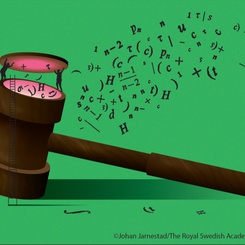In 1990, 35.9% of the world population was living in extreme poverty, unable to satisfy their basic needs for food, water and shelter or to afford decent sanitation, education, or health care. Three decades on, only 10% of the world population is still extremely poor. What explains this spectacular achievement? And what can be done to eradicate extreme poverty among the 734 million individuals who are still poor today?
The 1990s saw the development of two concurring causes, one big and one little, that together explain the decrease in extreme global poverty. The big one is China’s massive macroeconomic growth. The little one is a methodological revolution in the field of Development Economics. It is for the latter that Abhijit Banerjee (Massachusetts Institute of Technology, Cambridge, USA), Esther Duflo (Massachusetts Institute of Technology, Cambridge, USA) and Michael Kremer (Harvard University, Cambridge, USA) have been awarded the 2019 Sveriges Riksbank Prize in Economic Sciences in Memory of Alfred Nobel “for their experimental approach to alleviating global poverty”, as announced on October 14th, 2019.
While the methodological revolution is major, we can qualify it as “little” in the sense that it focuses on understanding the causes of economic prosperity by asking small and answerable questions on whether specific policy programs can lift people out of poverty. For example, instead of asking “What is the impact of education on economic prosperity?", the new approach is to ask “How can we incentivize children to go to school?” or “How can we decrease teachers’ absenteeism?” Taken together, the answers to these little questions have shed light on the big questions that have been on economists’ minds for a long time. That is why they are Big little questions. These questions are also classified as such due to the methodology used to answer them: randomized control trial experiments (RCTs).
When using randomized control trial experiments, economists behave like doctors testing for a new drug to cure a disease. The experimenter randomly assigns a treatment (such as providing information about the returns to schooling) to one group of families, and compares school attendance of children in such families with those from families that did not receive this information (the control group). This methodology allows to provide causal and quantifiable answers to the question: if we had one dollar to spend on a specific development program aiming at increasing schooling rates, what would be the policy that maximizes its social return? Kremer, Duflo, and Banerjee were inspired by both their professional and personal experiences when developing their approach. Michael Kremer launched the randomized control experiments after spending a year teaching in Kenya and later visiting on holiday, during which he thought of performing randomized evaluations. Esther Duflo, who, together with Abhijit Banerjee, contributed to broadening and deepening the use of this approach, was inspired by her mother, a medical doctor, to use experiments to study what does and doesn’t work in eradicating poverty.
By providing rigorous scientific answers to these little questions, this year’s Nobel prize winners have made a big contribution that has pushed the frontiers of knowledge in Economics, emphasizing the role of behavioral and psychological factors in explaining human behavior. Practically speaking, they have also guided the work of NGOs, governments and international organisations. Last but not least, they have transformed the relationship of economists with those on the ground and with policy-makers. Because designing and running these field experiments requires significant infrastructure on the ground, their approach has been by nature collaborative, pushing academics to interact more with not-for-profit organizations and with local communities. This direct contact with local communities has also helped reduce some of the negative stereotypes attached to those living in poverty. Indeed, Abhijit Banerjee, who grew up in Calcutta in a middle class family living in a neighborhood near a slump, emphasizes that poverty is multidimensional and that it can have myriad causes, including a lack of access to finance, health care, or education.
The aforementioned side effects of this methodological revolution are very welcome in a world of fake news and increasing skepticism about science. Additionally, by recognizing that some questions are more easily answered than others, this Nobel prize sends a message of humility to the economics profession. Finally, Esther Duflo has mentioned that she hopes to be a role model for future generations of young women economists but also for economists from under-represented minorities in the profession. As the youngest ever laureate of the Nobel prize in economics and only the second woman and fourth French national to be given the honour, she is certainly an inspiration to all.
Thinking beyond poverty eradication, the research of this year’s laureates may inspire policymakers around the world to push for more systematic policy evaluation and rigorous ex-ante policy designs that allow researchers and society at large to learn how to best allocate scarce resources to alternative uses. Yet, this methodological revolution should be seen as a complement, not a substitute, to alternative approaches. To quote their fellow Nobel laureate Angus Deaton, findings from field experiments may be neither scalable nor generalizable. Simply put, lack of generalizability (or as economists call it, "external validity") means that what is learnt in a rural village in Kenya may not be useful for understanding extreme poverty in another region or country. The issue of scale means that policies that produce certain effects in small groups may produce different results when applied to entire countries. Further, this method may not be applicable in other policy areas, for example monetary policy, where experimental approaches are significantly more challenging to implement.
Despite those caveats, the research of Abhijit Banerjee, Esther Duflo and Michael Kremer pushes us to rethink poverty by expanding the tools and methods available to us in the enquiry of its causes and of the best means to eradicate it. Their approach may inspire us all to rethink how we, as consumers, employees, managers, CEOs, politicians and citizens, direct our efforts to transform society for the better with pragmatism and escaping from sterile ideological postulates and dogmatism.









